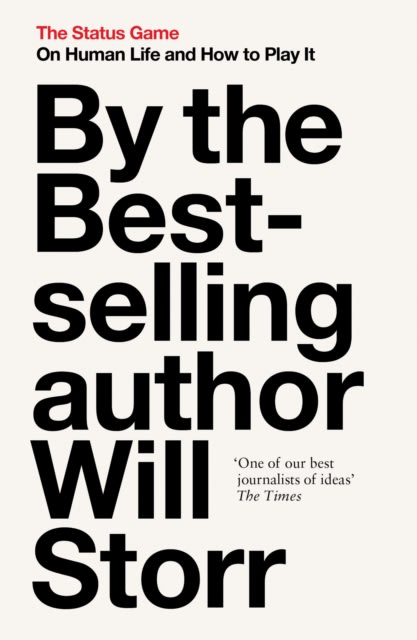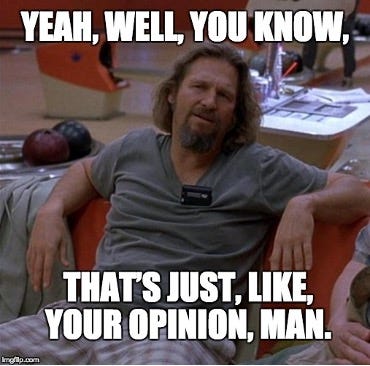30 Useful Concepts about Bullshit
Warning: extreme levels of cynicism
Whether it’s politics, the media, the workplace, or our own backyards, we’re surrounded by bullshit. Here are 30 concepts to help you understand it:
Bullshit (verb). To communicate without giving a shit about the truth; to propagandize, manipulate, or mislead; to pretend to know or understand things you don’t know or understand.
Self-bullshitting. The act of bullshitting yourself. Example: you want to do a bad thing, and you’re trying to convince yourself it’s okay. Your goal is not to figure out if the thing really is okay; it’s to come up with excuses for doing it.
Confabulation. A bullshit explanation for our behavior. When we don’t know why we did something, instead of saying “I don’t know why I did that,” we say we were following our hearts or expressing ourselves or venting or whatever. Much of who we are is a tapestry of confabulations.
Everything is bullshit. The conclusion of three premises: 1) We don’t really know why we do things. 2) We don’t really know why others do things. 3) Most of what we talk about implies we know why we and others do things.
Social brain theory. The enlarged brain of homo sapiens did not primarily evolve for tool use or practical intelligence, but for social bullshit like "arguing, rationalizing, politicking, rule-following, covert rule-breaking, and excuse-making."
Existential bullshitting. The game intellectuals play where they interrogate each other over their life decisions—including the "decision" to be alive at all—and compete to give the most eloquent, self-important answer.
Status game. We compete to be smarter, cooler, hotter, braver, kinder, fairer, richer, worldlier, and more virtuous than the people around us. It’s useful to frame the competition as a game, with rules and points, winners and losers—i.e., a status game.
Anti-status. The status you get from looking like you don't care about status. We avoid looking vain, insecure, or self-absorbed—and accuse each other of being these things—to gain status, or rather anti-status.
Performative apathy. An attempt to gain anti-status by pretending you don’t care what others think.
Status game collapse. When players of a status game gain common knowledge that they’re playing a status game. They suddenly see each other as vain, insecure, or self-absorbed, which sends them scrambling to play a different status game. This is one of the engines of cultural evolution.
Sacred value. A cover story for status-seeking designed to prevent a status game from collapsing. We deny we’re seeking dominance or superiority and instead pretend that we’re seeking honor, wisdom, beauty, authenticity, self-actualization, equality, morality, or the betterment of humankind.
Darwinian cynicism. The view that everyone’s basic desires are products of natural selection. This is cynical because evolution cannot favor a basic desire to make the world a better place—only the desire to help ourselves, our families, or our tribes.
The Vibes Theory of Money. Most people suck at economics. People mainly think about money as a way to convey information about status and social relationships—not as a proxy for goods and services. Money is more about vibes than stuff.
Alliance Theory. Political ideologies are explained by historically contingent (and sometimes random) alliances between ethnic, class, religious, and cultural groups. “The difference between liberals and conservatives is not what values they hold, but whom they view as their allies.”
Strange bedfellows. Political allies who are conspicuously dissimilar yet awkwardly find themselves in the same coalition—e.g., the alliance between Christian fundamentalists and free market libertarians, or between liberal college students and Islamic extremists.
Bullshit market. A place where people buy and sell bullshit. Competition to attract consumers results in cheaper, higher-quality bullshit. Western nations enjoy the greatest bullshit in the world. See also “rationalization market” (HT Dan Williams).
RightTalkism. The idea that making the world a better place means changing how people talk. Just make people say the right things and all our problems will be solved. (HT Robin Hanson).
Dark morality. When morality—the heartfelt conviction that we are doing the right thing—fuels tribalism, dishonesty, bullying, censorship, hatred, terrorism, and genocide.
Dark idealism. When idealism—the heartfelt conviction that we are pure and noble and benevolent—fuels dark morality, by blinding us to our biases and making those who don’t share our ideals seem evil or subhuman.
Likability determinism. The naive but widespread view (often implicit) that all good things are caused by good, likable people and all bad things are caused by bad, unlikeable people. To make the world better, all we have to do is give more power and status to the good, likable people—you know, us.
Incentive determinism. Human behavior is explained by social, economic, and political incentive structures. To make the world better, we need to understand those incentive structures and design them wisely.
Social paradox. A social signal designed to be concealed from both the signaler and the recipient. Example: virtue signalers don’t think they’re virtue signaling, and neither do the people who award them virtue. Virtue signals (and other status signals) occur underground.
Illusory hedonism. The intuition that what we want is inside our heads (happiness, inner peace) instead of out there in the world (high status, good relationships). Since getting what we want often feels good, we confuse correlation with causation: we mistakenly think that all we want is to feel good.
The happiness excuse. When we use the pursuit of happiness (or self-care or self-actualization) as an excuse for conspicuous consumption, self-entitlement, virtue signaling, careerism, or vanity projects. “I’m just doing this for me.”
Opinion. A subjective preference (e.g., for food, music, or policies), combined with a set of positive judgments about the people who share that preference (e.g., they’re smart and good) and a set of negative judgments about the people who lack them (e.g., they’re dumb and bad).
The Opinion Game. A status game we play with our opinions, where the objective is to “make the people who share our preferences look superior to the people who don’t, while concealing the fact that we’re trying to do that.”
The superhuman fallacy. 1) People who disagree with me are dumb and bad. 2) The reason they are dumb and bad is because of “human nature.” 3) Unstated implication: I am superhuman.
The desire problem. Most of our desires are about being better than, or better off than, the people around us. This means we cannot all get what we want, conflict is inevitable, and utopia (where everyone is satisfied) is impossible.
Intergenerational competition theory. The only way to solve the desire problem (see above) is for each generation to become higher status than the previous one. The older generation is okay with this, because the younger generation contains their progeny. This is the closest thing to utopia we’re capable of.
Toxic learning: The desire to learn about gossip, bluster, propaganda, outrage bait, disaster porn, and pseudo-profundity, while being bored by accuracy, nuance, and practical utility.








This is going into my saved pile, will be re-read often, and will never be deleted!
Nice. This is giving "On Bullshit" vibes.